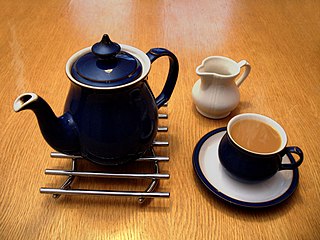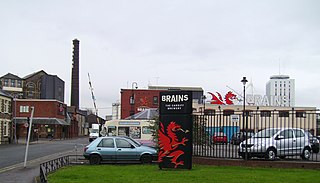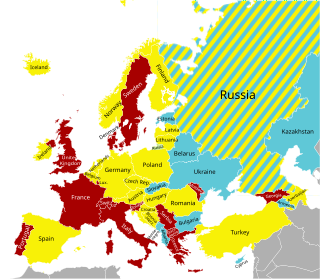
A drink or beverage is a liquid intended for human consumption. In addition to their basic function of satisfying thirst, drinks play important roles in human culture. Common types of drinks include plain drinking water, milk, juice, smoothies and soft drinks. Traditionally warm beverages include coffee, tea, and hot chocolate. Caffeinated drinks that contain the stimulant caffeine have a long history.

A soft drink is a drink that usually contains water, a sweetener, and a natural and/or artificial flavoring. The sweetener may be a sugar, high-fructose corn syrup, fruit juice, a sugar substitute, or some combination of these. Soft drinks may also contain caffeine, colorings, preservatives, and/or other ingredients.

Ginger ale is a carbonated soft drink flavoured with ginger. It is consumed on its own or used as a mixer, often with spirit-based drinks. There are two main types of ginger ale. The golden style is credited to the Irish doctor Thomas Joseph Cantrell. The dry style, a paler drink with a much milder ginger flavour, was created by Canadian John McLaughlin.

Diageo plc is a multinational alcoholic beverage company, with its headquarters in London, England. It operates from 132 sites around the world. It is a major distributor of Scotch whisky and other spirits. Distilleries owned by Diageo, produce 40% of all Scotch whisky with over 24 brands, such as Johnnie Walker, J&B and Vat 69

Traditional ginger beer is a sweetened and carbonated, usually non-alcoholic beverage. Historically it was produced by the natural fermentation of prepared ginger spice, yeast and sugar.

Alko Inc is the national alcoholic beverage retailing monopoly in Finland. It is the only store in the country which retails beer over 5.5% ABV, wine and spirits. Alcoholic beverages are also sold in licensed restaurants and bars but only for consumption on the premises.

Container-deposit legislation is any law that requires the collection of a monetary deposit on beverage containers at the point of sale and/or the payment of refund value to the consumers. When the container is returned to an authorized redemption center, or retailer in some jurisdictions, the deposit is partly or fully refunded to the redeemer. It is a deposit-refund system.

Ynyshir is a village and community located in the Rhondda Valley, within Rhondda Cynon Taf, South Wales. The name of the village means "long island" in Welsh and takes its name from a farm in the area, falling within the historic parishes of Ystradyfodwg and Llanwynno (Llanwonno). The community of Ynyshir lies between the small adjoining village of Wattstown and the larger town of neighbouring Porth.

Beer in Wales can be traced to the 6th century. Since the 2000s, there has been a growing microbrewery industry in Wales.

Asahi Group Holdings, Ltd. is a Japanese global beer, spirits, soft drinks and food business group headquartered in Sumida, Tokyo.
Heineken Lager Beer, or simply Heineken is a pale lager beer with 5% alcohol by volume produced by the Dutch brewing company Heineken N.V. Heineken beer is sold in a green bottle with a red star.

The primary beer brewed and consumed in Chile is pale lager, though the country also has a tradition of brewing corn beer, known as chicha. Chile's beer history has a strong German influence – some of the bigger beer producers are from the country's southern lake district, a region populated by a great number of German immigrants during the 19th century. Chile also produces English ale-style craft beers while also developing its own craft beer identity.

Alcohol preferences in Europe vary from country to country between beer, wine or spirits. These preferences are traditionally associated with certain regions. Hence, the Central European pattern of alcohol consumption is associated with beer-drinking, the Mediterranean pattern with wine-drinking and the Eastern or Northern European pattern with spirit-drinking countries. However, traditional preferences do not necessarily correspond to current drinking habits, as beer has become the most popular alcoholic drink world-wide.
Alcohol has been illegal for Muslim Iranian citizens since the establishment of Islamic Republic government in 1979.
The food and drink industry of Wales refers to food and soft drink companies as well as distilleries and breweries in Wales. The food and drink sector is classed as a priority economic sector in Wales. It involves 170,000 people that contribute to gross sales of £17.3 billion.

Alcohol in the United Kingdom is legal to buy, sell and consume. Consumption rates within the country are high among the average of OECD nations however average among European countries but consistently ranks highest on binge drinking culture. An estimated 29 million people in the United Kingdom drank alcohol in 2017.












